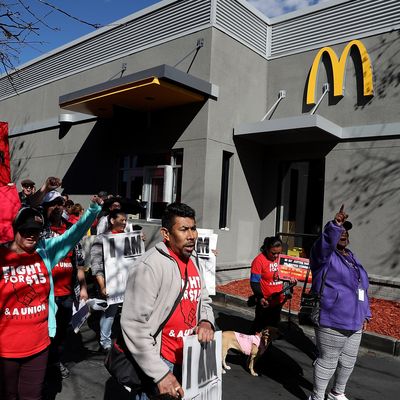
As McDonald’s shareholders conduct their annual meeting on Thursday, many of the fast-food chain’s workers are going out on strike. The action comes days after Fight for $15 and a Union announced a new round of sexual-harassment charges and lawsuits against McDonald’s. In a press release, the campaign said the strikes also mark the launch of Fight for $15 2020, “a worker-led effort to push candidates to embrace unions as the best way to tackle inequality and fight racism.” The Fight for $15 campaign is not a union, but it demands one for low-wage workers, and it is supported by the Service Employees International Union. Its strategy for 2020 in some ways mirrors the endorsement processes rolled out by the American Federation of Teachers and the National Education Association. The campaign says it will hold town halls in early primary states and host “walk-a-days,” where candidates will “will experience a day in the life” of McDonald’s workers; the AFT, for example, announced a similar plan in March.
But overall, Fight for $15’s 2020 program is unique to it and the low-wage workers it organizes. It will deploy its own organizers in Iowa, South Carolina, Nevada, and New Hampshire, and plans to hold protests at the first two Democratic debates. A voter-engagement program will launch in Michigan and Wisconsin, among other “key battleground states,” the campaign says. It’s a major show of force from an increasingly successful movement, and presidential candidates are paying attention.
Cory Booker, Julián Castro, Bill de Blasio, and Jay Inslee are joining workers on picket lines. Bernie Sanders emailed supporters on Wednesday, urging them to go to picket lines to support workers, and streamed a video town hall with McDonald’s workers on Facebook. Claire Sandberg, the national organizing director for the Sanders campaign, told New York in a statement, “As Bernie says, this is not just a campaign, it’s a movement. We’re building the largest volunteer army in the nation not just to win the Democratic nomination, but also to mobilize people to show up in key fights where people’s lives and livelihoods are on the line. We are proud to uphold Bernie’s commitment to workers and we will continue to activate our supporters and urge them to join picket lines across the country to support the fight for a strong labor movement.”
Labor votes are valuable to Democratic candidates, though their commitment sometimes seems fickle. Joe Biden held his campaign kickoff rally at a Teamsters hall in Pittsburgh, but walked past protesting members of the National Union of Healthcare Workers to attend a fundraiser hosted by a Kaiser Permanente board member in California. (NUHW, which represents mental health clinicians at Kaiser Permanente, is engaged in a labor dispute with the hospital chain.) Other front-runners more consistently match rhetoric to action. Sanders has now repeatedly used his email list to encourage supporters to demonstrate at picket lines. Elizabeth Warren rallied with striking Stop & Shop workers in April. Kamala Harris unveiled a major policy proposal to raise teacher salaries in March, a gesture toward restive education unions. Support for a $15 minimum wage is also becoming mainstream among Democratic candidates, and in the party itself.
But McDonald’s workers, like union members, plan to keep up the pressure on the men and women who want to be their president. The campaign’s 2020 strategy is designed to keep the movement — and its emphasis on the right to organize — firmly in the public eye. Candidates will have to work for their votes, just as they compete for union endorsements.
Bleu Rainer, a McDonald’s worker who is based in Tampa, Florida, and will join a demonstration in Dallas, Texas today, told New York that he hopes candidates will commit to a universal, $15 minimum wage. But he wants a union, too, and he wants candidates to listen. “We’ve had these same demands since 2012, when people thought we were crazy,” he said. “They thought that we would never receive the victory that we have received so far. And it’s only happened because workers like myself got up in the street, went on strike, did everything they can do, did whatever it took to get our rights and get $15 an hour because our families couldn’t survive anything less.”
“We want to make sure that every candidate in 2020 understands how serious we are about getting union rights and higher wages to work in this nation,” he added.






























